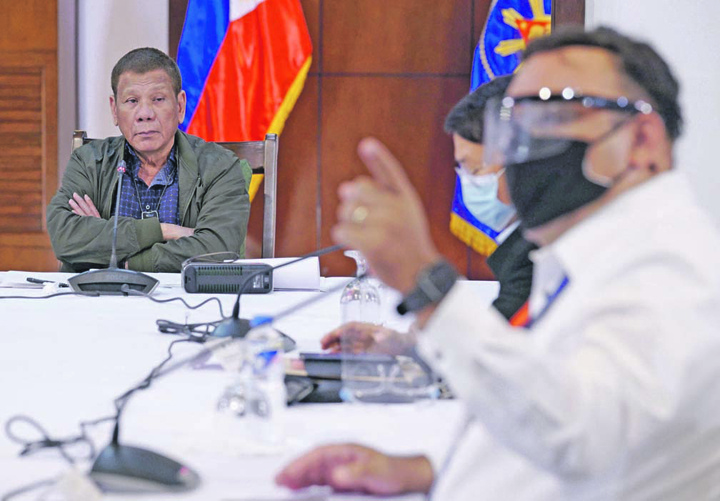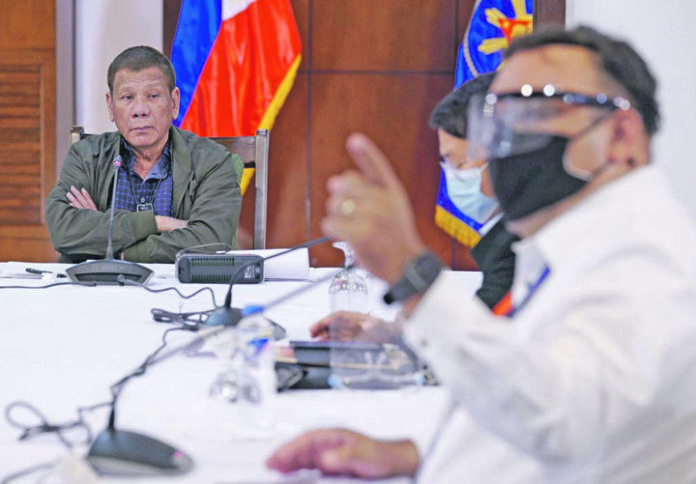
POLICY deficiencies and restrictions as well as “supply” issues are now threatening to delay the start of the government’s Covid inoculation drive this month.
President Duterte on Thursday made several issuances in attempts to address some of these issues.
Presidential spokesman Harry Roque said the expected arrival of the 600,000 doses of Covid-19 from Sinovac, which are being donated by the Chinese government, might not be delivered on February 23, 2021.
He said unless the Food and Drug Administration (FDA) is able to issue an Emergency Use Authorization (EUA) for Sinovac by February 18, 2021, the Chinese government will not be able to ship the vaccines as scheduled.
As of 4:30 pm on Thursday, FDA had yet to approve the EUA for Sinovac’s Covid-19 vaccine. It had earlier explained that Sinovac still had not submitted certain paper requirements vital to a decision on an EUA.
Causes of delays
Chief implementer of the government’s national policy on Covid-19 Carlito G. Galvez, meanwhile, also said delivery of the 117,000 doses of Pfizer-BioNTech vaccine and 5 million doses of AstraZeneca-Oxford vaccine from the Vaccines Global Access (Covax) facility also face delays due to the pending indemnification agreement.
He said they are still waiting for Pfizer’s
action on the indemnification agreement, which they submitted.
The agreement will ensure the Philippine government will pay for the compensation of people who suffer adverse reactions tied to the administration of the Covid-19 vaccine.
“For the information of everybody, during our initial negotiation, it was not required by Pfizer. It is only just now [that they asked for it], so we were surprised because before, the only one seeking an indemnity clause was Johnson and Johnson,” Galvez explained.
In the case of Covid-19 vaccines from British drug maker AstraZeneca, Galvez said they already finalized the necessary indemnity agreement; however, they were unable to determine which country would supply the expected 5 million doses.
The AstraZeneca-Oxford vaccine is currently being manufactured in Thailand, India and South Korea.
Until recently, Galvez said they thought the supply of AstraZeneca-Oxford vaccine that will be sent to the Philippines will come from Thailand due to its proximity.
However, the Philippine officials were informed just a few days ago that the supply to be shipped to Manila will come from South Korea. This “supply issue,” Galvez said, caused delay in vaccine delivery.
Despite these setbacks, Galvez remained hopeful they can start the deployment of Covid-19 vaccines from Sinovac and Pfizer-BioNTech this month.
The bulk of vaccine deployment, he said, is expected to start from the second quarter and third quarter of the year.
Indemnification law
Galvez explained most pharmaceutical companies are hesitant to send their vaccine to the country without an indemnification agreement since they fear lawsuits similar to what happened to French manufacturer Sanofi, whose Dengvaxia vaccine was used on 800,000 Filipino schoolchildren.
To address this concern from vaccine makers, Duterte certified as urgent the passage of Senate Bill (SB) 2057 and its counterpart bill in the House of Representatives, House Bill (HB) 8648, which created the indemnity fund for Covid-19 vaccines.
“The indemnification clause is important for the allocation of the indemnity fund and also vaccine makers will have confidence [to start shipping their vaccine to the country],” Galvez said.
Congressional response
With the urgent certification from the Palace, Speaker Lord Allan Velasco said the House can now approve HB 8648 or the proposed Emergency Vaccine Procurement Act of 2021 both on second and third reading on Monday.
In a statement, Velasco welcomed Duterte’s move allowing local government units (LGUs) to make advance payment —beyond the 15 percent allowed by law—for the purchase of Covid-19 vaccines under a memorandum the Chief Executive has signed.
“We will do our best to finish it by Monday [February 22],” said the Speaker.
“This is an important step in our fight to defeat the spread of Covid-19 as this allows the speedy procurement of the most effective vaccines by LGUs, cognizant that any delay would have serious consequences on how we move forward from this pandemic,” he added.
House Bill 8648, introduced by Velasco, seeks to expedite the purchase and administration of vaccines to ensure that all Filipinos, particularly the elderly and those in the marginalized sectors, will be inoculated and protected from the deadly disease.
The bill, which expedites the purchase and administration of vaccines, is pending for second reading in the plenary.
It exempts LGUs from compliance with the requirements under RA 9184 or the Government Procurement Reform Act and other related laws.
Under the bill, the provinces, cities and municipalities may purchase, only in cooperation with the DOH and national task force against Covid-19, through a multiparty agreement which shall include the DOH and the relevant supplier of Covid-19 vaccine or ancillary supplies or services.
Earlier, House Committee on Economic Affairs Chairman Junie Cua, sponsor of the bill, said an amendment will be introduced to include the Covid-19 National Vaccine Indemnity Fund, to be administered by PhilHealth.
He said the P500-million fund is being established to compensate any person inoculated under the Covid-19 Vaccination Program, in case of death or for the medical treatment of any serious adverse event. The amount shall be sourced from the Contingent Fund of the Office of the President.
New memorandum order
While the indemnification bill remains pending in Congress, Duterte also issued Memorandum Order (MO) No. 51 allowing the Department of Health, National Task Force against Covid-19 (NTF) and LGUs to exceed the 15-percent limit when making advance payments for their vaccine acquisition.
This will also allow the national government and LGUs to comply with requirements of some drug makers for a 50 percent advance payment, when purchasing their vaccines.

